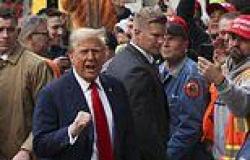
By David Shepardson and Valerie Volcovici
WASHINGTON (Reuters) - U.S. President Donald Trump's administration has formally ended talks with California over federal plans to roll back fuel economy rules, the White House said on Thursday, setting the stage for what could be a lengthy legal fight over the state's ability to regulate greenhouse gas emissions.
California could be joined in any court fight by 12 other states that have adopted its standards and want stricter rules to fight climate change. Several other states have also demanded the administration abandon its August proposal to freeze federal fuel efficiency standards after 2020 and take away California's ability to impose stricter emissions rules.
The administration has said tighter emissions controls would make automobiles too expensive.
"The administration is moving forward to finalize a rule later this year with the goal of promoting safer, cleaner and more affordable vehicles," the White House said in a statement.
California has been allowed to set state standards that are stricter than federal rules under an exemption granted by the Environmental Protection Agency. The administration wants to revoke that waiver, saying California should not "dictate" policy for the rest of the country and arguing that another law preempts California from setting its own vehicle rules.
California Attorney General Xavier Becerra said the administration's decision to scrap the talks was a sign of its "weakness and fallibility."
"California and states throughout America are prepared to defend our national Clean Car standards even if the Trump administration intends to go AWOL," he said in an email statement.
California Air Resources Board Chair Mary Nichols said the end of negotiations was "unfortunate."
General Motors said it was "disappointed" that the talks ended. GM, Ford Motor Co and Fiat Chrysler Automobiles generate most of their global profits from U.S. sales of large pickup trucks and sport utility vehicles. All three have discontinued or plan to drop small and medium-sized sedans from their lineups, making it harder for their fleets to meet tighter emissions standards.
"We continue to prioritize the need for one national program and remain hopeful that the parties can find a solution to achieve this goal," GM said, adding it was committed to "an all-electric future."
The Alliance of American Automobile Manufacturers urged the talks to continue.
"One national program is worth striving for because it is the best way to maximize fuel economy and carbon reductions while preserving vehicle affordability and employment," the group said in a statement. "We encourage everyone to keep focusing on how we get there."
An administration official familiar with the negotiations said California had failed to compromise. Instead, the official said, the state insisted on sticking with tougher Obama-era mandates and would only offer a short extension in applying them.
The official also said California "demanded" that the federal government "surrender" authority to set emissions and economy standards for the rest of the country.
Trump escalated his administration's power struggle with California on Tuesday, when the administration canceled $929 million in federal funds for a California high-speed rail project. The state's governor complained that was retaliation for California leading a 16-state coalition challenging Trump's national emergency to obtain funds for building a U.S.-Mexico border wall.
Obama-era rules would require automakers to roughly double average fuel efficiency by 2025, sharply reducing emissions of carbon dioxide, which is linked to climate change. It was one of that administration’s most significant climate policy actions.
Senator Tom Carper of Delaware, one of 13 states that had adopted California's standards, said he was "deeply disappointed" by failure of the talks.
"Repeatedly, I have urged this administration to strike a deal with the State of California and seize the win-win opportunity to keep the American auto industry globally competitive and create more good paying jobs here at home while protecting our environment," he said in a statement.
(Reporting by Ben Klayman, Joe White, Valerie Volcovici, David Shepardson, Susan Heavey and Chris Sanders; Writing by Diane Bartz and Meredith Mazzilli; Editing by Chizu Nomiyama and David Gregorio)
all right reserved for yahoo news





